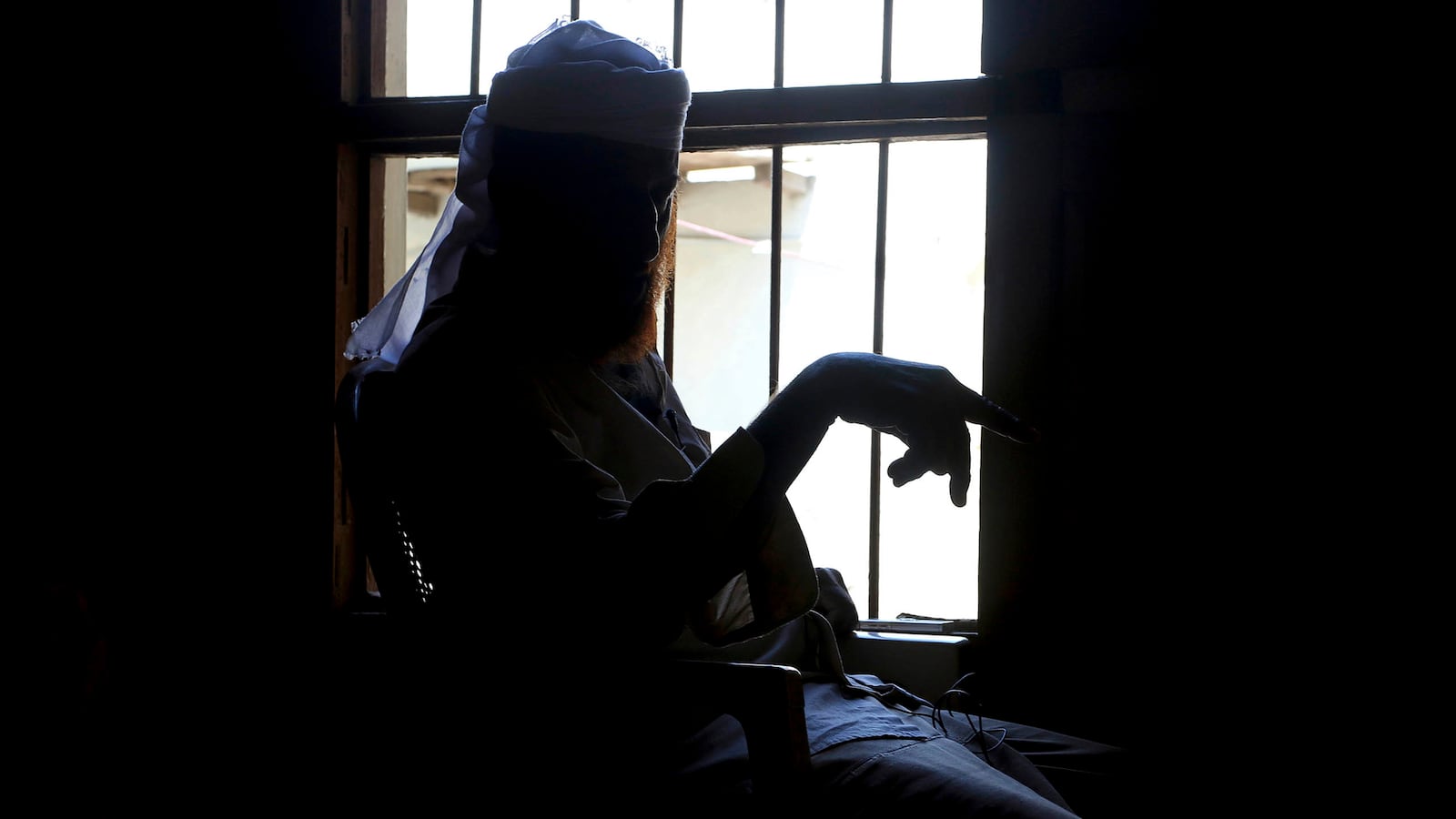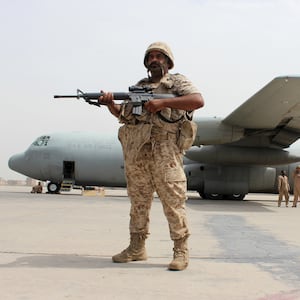When it came time for the interrogators to question a Yemeni man The Daily Beast will call Salvatore, they blindfolded their prisoner and set Salvatore before a two-man team. One was an Emirati. Beside him, Salvatore could hear another man whispering in English—in what Salvatore thought was an American accent. The Emirati called him John.
Salvatore, who admits that 20 years ago he was a member of al Qaeda, understood John to be American; he recalled being interrogated by Americans before. Now, with the U.S. a part of the Saudi-Emirati coalition bombarding Yemen since March 2015, Salvatore suspected the Americans had taken a renewed interest in him. John would whisper something, and the Emirati would question Salvatore.
Once the questions ended, rougher treatment began. The Emirati interrogator, Salvatore would hear while blindfolded, would call out to colleagues by nicknames “and tell them what to do.” One of those colleagues was known by the nickname Hitler.
Hitler would “electrify me,” Salvatore said. “They would strip me naked, they would beat me very harshly and slowly you start to understand the dynamics in the room. These are the two people, one of them is overseeing the whole interrogation”—by which Salvatore meant John, the presumed American—“and the other is doing the questioning and ordering the torture.”
Salvatore’s account is fragmentary, as is that of another ex-detainee interviewed by The Daily Beast named Adel Salem Nasser al-Hasani, who gave similar accounts of a U.S. presence in Yemeni torture prisons based on what he saw—victims weren’t always blindfolded—heard, and heard other prisoners say. You don’t have to take these two former detainees’ word for it, however: The U.S. military now admits that American troops are in the facilities. But Salvatore and al-Hasani’s accounts also challenge the official U.S. position, which is that despite American service-members being present in Yemeni prisons, the U.S. doesn’t know anything about any torture that happens in detention centers run by U.S. allies.
In December, in a brief report to Congress first reported by The Intercept, the Pentagon formally acknowledged that U.S. military personnel operate in the Yemen prisons. “U.S. forces do not conduct detention operations in Yemen; rather, U.S. forces conduct intelligence interrogations of detainees held in partner custody,” the Pentagon reported.
The Emiratis are in Yemen ostensibly to defeat an uprising by the Houthi movement backed by Iran. But inside a complex known as the Coalition Base in Aden’s Bureiqa district, the interrogator wasn’t asking Salvatore about the Houthis. Salvatore wasn’t even locked up because of any affiliation with the Houthis—in fact, he was part of a local resistance to the Houthis in the province of Abyan. His interrogators wanted to know about a man Salvatore was detained with earlier in his two years inside the abusive prisons of the Yemen war, a man whom Salvatore understood to have gone off fighting for extremist jihadist groups in Iraq.
“That’s a person of interest for the Americans,” Salvatore told The Daily Beast through a translator. That is, while the U.S. is part of the Saudi-Emirati coalition fighting the Houthis in Yemen, it’s also pursuing a longstanding assault on al Qaeda offshoots and other terrorists.
Salvatore can’t know with certainty that John is an American, or an American service-member or intelligence operative. He was blindfolded during his interrogation, so he couldn’t see what John looked like or if he wore a U.S. military uniform.
But he and al-Hasani tell The Daily Beast about a conspicuous American presence inside multiple Aden prisons where they were electrocuted, beaten and sexually threatened, and where others are believed to have been raped. While they were blindfolded during interrogation sessions, they weren’t blindfolded in their cells, where they say they were at times able to catch glimpses of the non-Arab men inside the prisons. Their interviews were facilitated by the human rights group Reprieve.
Much of this alleged American presence, they and others whose relatives were and are inside these brutal prisons say, was transient, involving prison inspections or visits. Both men say they saw Americans in military uniforms, complete with American flag insignia. They also say they believe there were contractors inside as well—citing both people they observed and the whisper networks inside the cells.
U.S. Central Command didn’t answer questions for this story by deadline. The United Arab Emirates’ Washington embassy didn’t respond to questions for this story by deadline. The CIA declined comment.
Al-Hasani was also involved in fighting the Houthis before the Emiratis and their Yemeni partners accused him of defaming them on a Twitter account he didn’t have. Like Salvatore, he said he saw Westerners in military uniforms at the Coalition Base and another prison, known as Bir Ahmed, in Aden. “It resembles the U.S. military uniform, a khaki uniform that the U.S. military wears, like the U.S. Army uniform,” he said. “They’re all really tall and big, huge.” From other detainees, he heard that some might be contractors. Inmates used an infamous shorthand to refer to the perceived contractors: Blackwater.
A Yemeni attorney who works with ex-detainees and people trying to find relatives disappeared in the Emirati-run prisons said most of the questioning their clients describe is “not related to the struggle against the Houthis. They’re not the kinds of questions that would be of interest to the Yemeni government” that the Emiratis are ostensibly reinstalling. The attorney, who asked to remain anonymous to avoid Emirati reprisal, said those questions concern counterterrorism, something of primary interest for Americans.
Both al-Hasani and Salvatore described gruesome torture that they experienced at the hands of the Emiratis. Some of the brutality occurred in conjunction with their interrogation. Some of it occurred seemingly for its own sake.
Al-Hasani recalled being interrogated multiple times during a two-week period at the Coalition Base early in a detention that lasted a year and nine months. They stripped him naked and fired up a device whose electrical sparks he could make out through his blindfold. “Most often they electrocuted me under my armpits and my genitals,” he said.
After two weeks, the Emiratis stopped interrogating al-Hasani, but they didn’t stop beatings and threatening him. “They’d come in my cell, hang me from the ceiling by my hands and beat me,” he said. “Sometimes they’d drag me out of the cell and kick me in my genitals—I still suffer from that—without asking me any questions.”
Emirati guards both threatened and used sexual assault as part of their repertoire. Al-Hasani and Salvatore both said the Emiratis had an object known as the “Opener” that they would use to anally penetrate detainees. “Prisoners would come back to their cell bleeding,” he said.
“A lot” of detainees experienced the Opener, “and some of them were even raped,” Salvatore said. “They would come back and they would be bleeding from the rectum for two or three days. Their underpants or their towels would be soaked with blood.” While Salvatore didn’t experience the Opener, his interrogators and guards would “strip me naked and threaten that they were going to rape me.”
Independently, the two ex-detainees and the attorney described a dog inside the Coalition Base which Emirati guards would use to threaten detainees. The dog, said to have a blonde coat, was nicknamed Shakira.
“She was huge, the size of a donkey,” al-Hasani said. “They’d use her for intimidation… ‘If you don’t talk, we’ll let the dog loose on you.’” Most often the dog would snarl and the guards would snap her leash back before Shakira bit, but al-Hasani said he knew of one case when Shakira tore off skin from a detainee’s chest and stomach.
“They bring it so close that you can feel its breath next to you,” Salvatore said. “You feel as if she’s angry, she’s going to eat you. It’s a way of intimidation. It didn’t bite me myself, but it did bite some of the others.”
This is far from the first account of torture inside the Emiratis’ prisons in Yemen. A report prepared for the United Nations Human Rights Council in September found that at one of the prisons where al-Hasani and Salvatore were held 200 detainees “were stripped naked in a group while personnel of the United Arab Emirates forcibly examined their anuses. During this search, multiple detainees were raped digitally and with tools and sticks” in March 2018. A detainee at the Coalition Base told Amnesty International that he was “kept in a hole in the ground with only his head above the surface for up to three days during which he was only given a small amount of water twice a day and left to defecate and urinate on himself in that position.” (Full disclosure: This reporter’s wife works for Amnesty International.)
Nor is this the first account of American involvement in Yemen’s torture prisons. In July 2017, the Associated Press reported that the U.S. “provides questions to the Emiratis and receives transcripts of their interrogations,” though the AP stopped short of reporting U.S. participation in the torture.
Despite all that, the Pentagon insists it knows nothing about any torture, whether involving Americans or allies. “DoD has determined that DoD personnel have neither observed, nor been complicit in, any cruel, inhuman, or degrading treatment of detainees in Yemen,” its recent report to Congress said. Indeed, it continued, it couldn’t say any such torture was occurring at all: “DoD has not developed any independent, credible information indicating that U.S. allies or partners have abused detainees in Yemen.”
All that is nonsense to Salvatore, who considers the Americans a critical joint in the intelligence pipeline flowing into and out of the torture prisons. “Why else would there be Americans in a prison full of detainees and interrogators trying to extract information?” he said. “For me, it only makes sense that [the Emiratis are] feeding information to someone, and that someone is the Americans.”
Reprieve attorney Jennifer Gibson said the accounts of Salvatore and al-Hasani underscore the depth of the unanswered questions about American involvement in a brutal prison complex run by its coalition partners.
“Earlier this month, the Department of Defense again denied it had any ‘credible’ evidence that its key partner in Yemen is torturing people in its prisons. Now a few brave Yemenis are speaking out, telling stories not just of UAE torture, but of American involvement in that torture—indeed of Americans in the room while they were being tortured,” Gibson said. “These individuals are speaking at great personal risk. The American public urgently needs answers about what the U.S.’ role is in these abuses—and who knew about it at the Pentagon.”
On Wednesday, members of Congress opposed to the Yemen war re-introduced a resolution in both the House and Senate to compel American withdrawal from the intelligence and targeting support the U.S. military continues to provide. Contending that U.S. participation in a war never declared by Congress violates the 1973 War Powers Resolution, it’s similar to the one that the Senate passed on a 56-41 vote in December.
But it’s a new Congress, requiring a new effort at getting the U.S. out of Yemen. Led by Ro Khanna (D-CA), the resolution has the support of Democratic leadership and is likely to pass. Democratic aides say the timing of the vote is unclear but could come sometime next month.
In the Senate, the foreign relations committee will receive Vermont Independent Bernie Sanders’ companion resolution, cosponsored by Utah Republican Mike Lee and Connecticut Democrat Chris Murphy. Sanders is eyeing a discharge petition should the committee sit on the bill, much as Sanders and his allies used last year, to maintain momentum for the antiwar maneuver.
Still, passage is harder in a Senate with a larger GOP majority—and to become law, the resolution requires the signature of President Trump, who has been staunchly behind his Saudi and Emirati partners. Team Sanders considers that less an endgame than a challenge to Trump where, they bet, he’s weak.
“Passing the War Powers Resolution will send a strong signal to President Trump that Congress is prepared to reassert authority over matters of war and force the president to explain to the American people why U.S. armed forces are supporting the despotic Saudi regime in their devastating war in Yemen,” said Sanders spokesperson Josh Miller-Lewis. “If Trump believes that the U.S. military should be in Yemen, let’s have that debate, but the president does not have the power to declare war without the consent of Congress and the American people.”
For Salvatore, the American complicity in his torture is beyond dispute.
“The Americans are there 100 percent,” said Salvatore. “Why would they blindfold us? So that we wouldn’t say anything. So we wouldn’t be able to expose them.”








